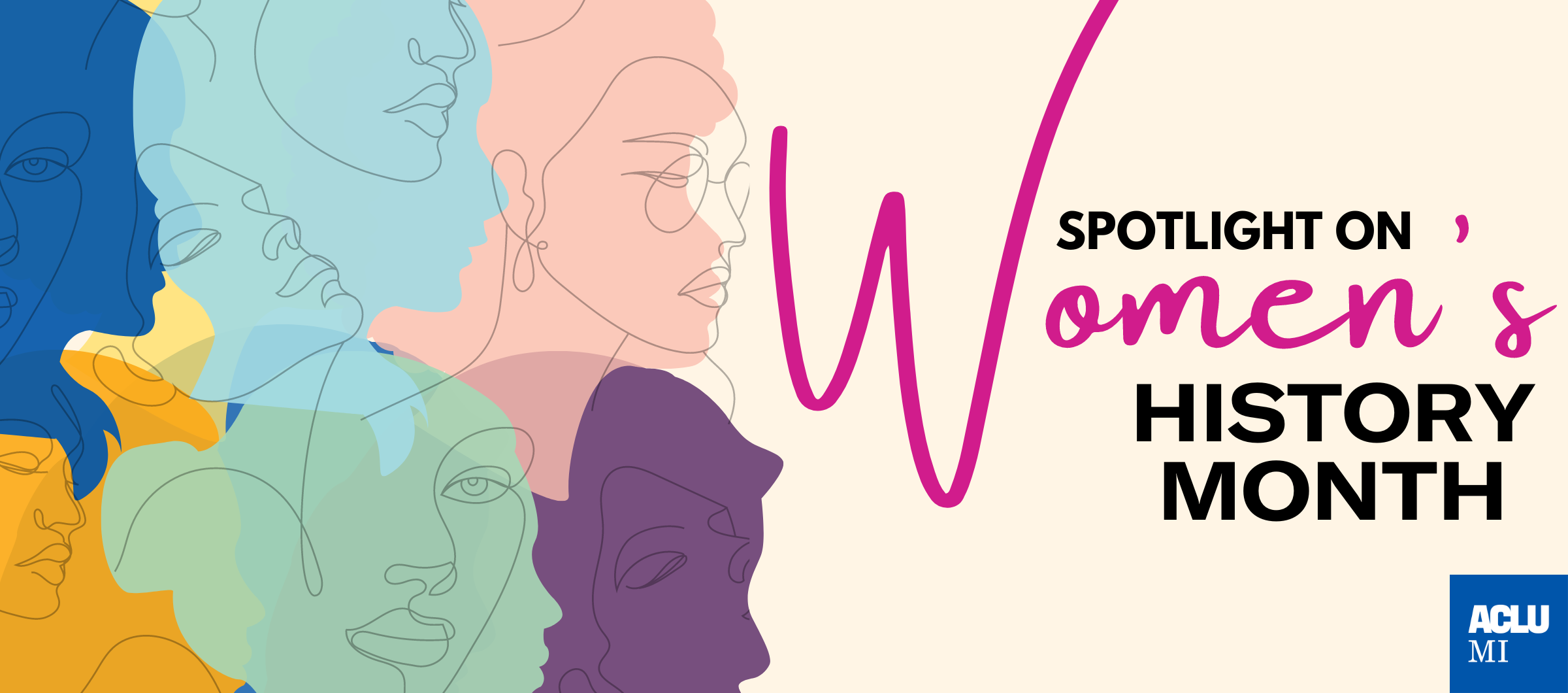To celebrate Women’s History Month, some ACLU of Michigan staff wrote about a woman whom they admire. While the diversity of the women chosen is wide-ranging in their identities and accomplishments, all share this in common: the courage to blaze their own path in hopes of creating a more equitable world.
Here are their inspiring stories.
Nora K. Jemisin, American Science-Fiction and Fantasy Writer

As a child, Nora K. Jemisin, who is Black, never saw herself in the science fiction and fantasy stories that she loved. In the rare instances where Black characters were present, they were typically viewed through a utopian lens where skin color didn’t matter. Even as a youngster, she’d already learned firsthand how far from the truth that depiction was. When she started writing her own fiction as an adult, the rejection letters for her stories would routinely contend that fantasy readers didn’t want Black characters in their books, and that Black people didn’t read fantasy. Undeterred, she kept at it. The result?
In 2018, N.K. Jemisin became the first writer ever to win three consecutive Hugo awards, widely considered the premier award recognizing excellence in Sci-fi and Fantasy writing. Adding to the accomplishment is the fact that each of the three wins were for parts of her “Broken Earth” trilogy, which she describes as “the human history of structural oppression.” No other trilogy has had each installment win the Hugo.
I’m inspired by the creativity Jemisin cultivates in devising such rich and evocative worlds. I’m inspired by the strength it took to work in a genre where she was neither welcomed nor, initially, appreciated. And I’m inspired by the perseverance she showed, as well as the insight that it took, to create Black science fiction and fantasy that can speak to all people.
Sarah Gennaro, development operations coordinator
Lilianna Angel Reyes, Activist
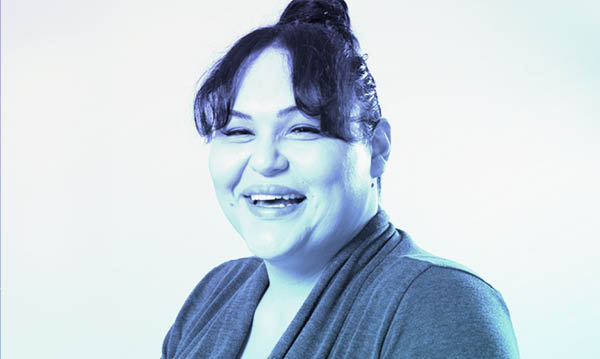
In a world where trans women face incredible danger simply because of who they are, Lilianna Angel Reyes, a trans Latina woman, demonstrates incredible personal courage on a daily basis by refusing to be intimidated by bigots or cowed by fear. She also helps others in her community find the strength and resources needed to also be their authentic selves. As director of the Highland Park Ruth Ellis Center, which provides services for LGBTQ+ youth, and young adults experiencing homelessness, Lilianna helps create a safe space that allows young people to be themselves. This includes providing access to hot dinners, laundry facilities, peer support groups, safer sex supplies, help with job applications, and so much more.
The Trans Sistas of Color Project that she co-founded aims to uplift, influence, and impact the lives and well-being of trans women of color in Metro Detroit by offering self-defense courses, career support, and emergency assistance. Through these roles, Lilianna is always willing to educate and speak on topics impacting marginalized populations. She has been quoted by NBC news as saying that she does this work because of her history and identify, but also because “[t]here have been enough trans women of color who are murdered each year who put their bodies on the line to be themselves.” In our own advocacy efforts, we sometimes forget that when a member of a marginalized group is outwardly advocating for that group in the world, it can be a vulnerable, exhausting, and traumatizing thing. And I just think that it’s a truly amazing person who finds the strength and the courage to do that every single day. In that regard, I can think of no one who is more fearless, or deserving of recognition, than Lilianna Angel Reyes.
Syeda Davidson, senior staff attorney
Grace Lee Boggs, Revolutionary Social Activist
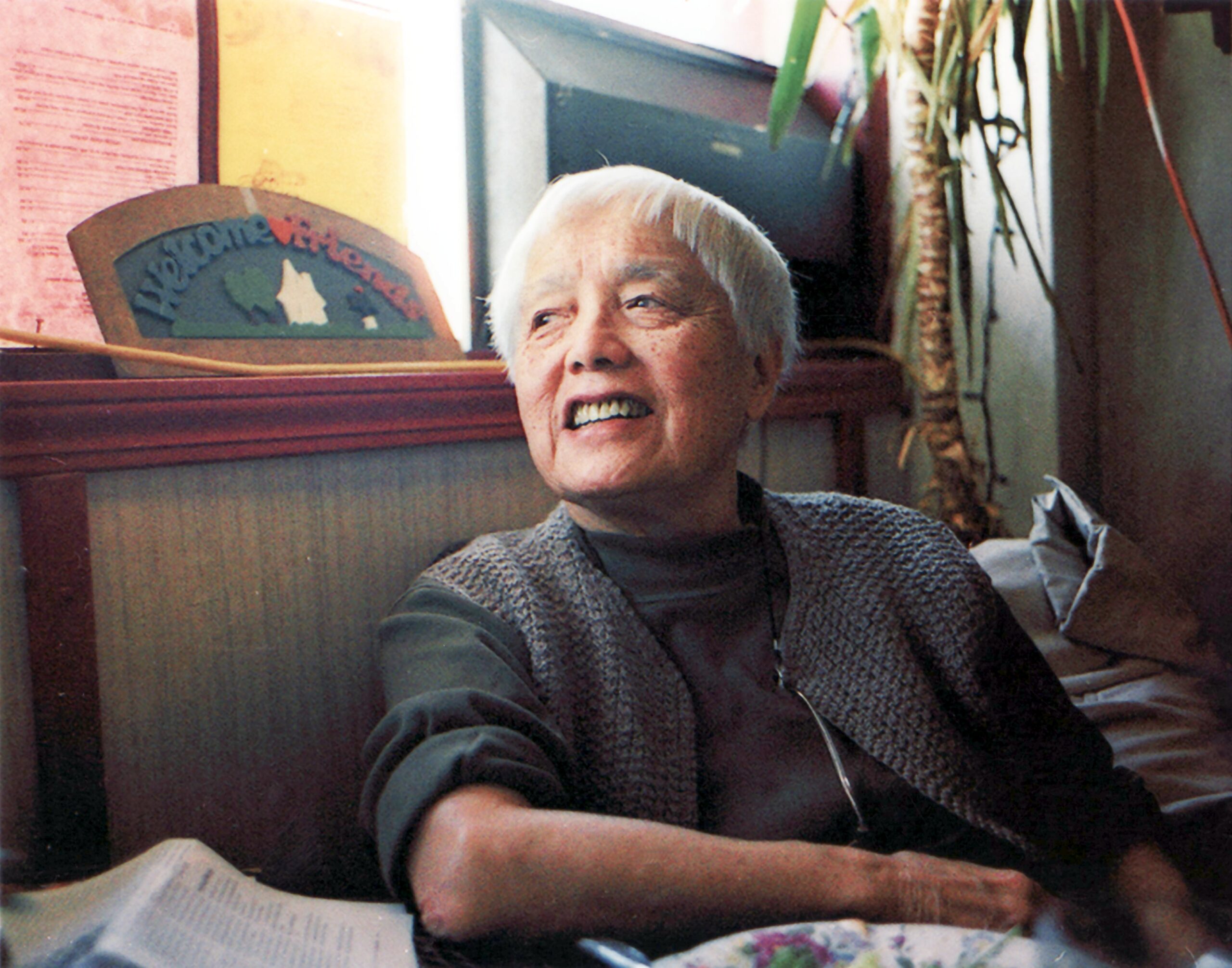
The daughter of Chinese immigrants, Grace Lee Boggs obtained a doctorate in philosophy from Bryn Mawr in 1940, a time when relatively few women were reaching those academic heights. And though she would go on to be recognized as a leading leftist intellectual, it was as a community activist and organizer in the fight for social justice that she had the greatest impact. A Detroiter since 1953, she grounded her work in the need for constant community organizing and demanded that power structures account for the fact that oppression is a moral failing that denies the humanity and agency of the oppressed.
An outspoken feminist, Grace was particularly well known for working across class, gender, and racial lines, and for helping form cohesive social movements and solidarity. She helped organized opposition to the spread of blight in in her adopted city and opposed utility shut-offs, while also helping establish affirmative programs to promote community wellbeing, such as food cooperatives programs, and the James and Grace Lee Boggs charter school. She helped found the Detroit Summer program in 1992, an intergenerational, grassroots, multicultural youth collective that seeks to “redefine, rebuild, and re-spirit the city of Detroit from the ground up.” Touching thousands of lives since its inception, the program is but one of the initiatives that, as noted on the website maintained by the James and Grace Lee Boggs Center To Nurture Community Leadership, “gave Grace’s pedagogy life and an urban scale of influence that continues to live on in the urban fabric of civic activism in Detroit today.”
Phil Mayor, senior staff attorney
Lorraine Hansberry, Playwright, Humanist and Political Activist
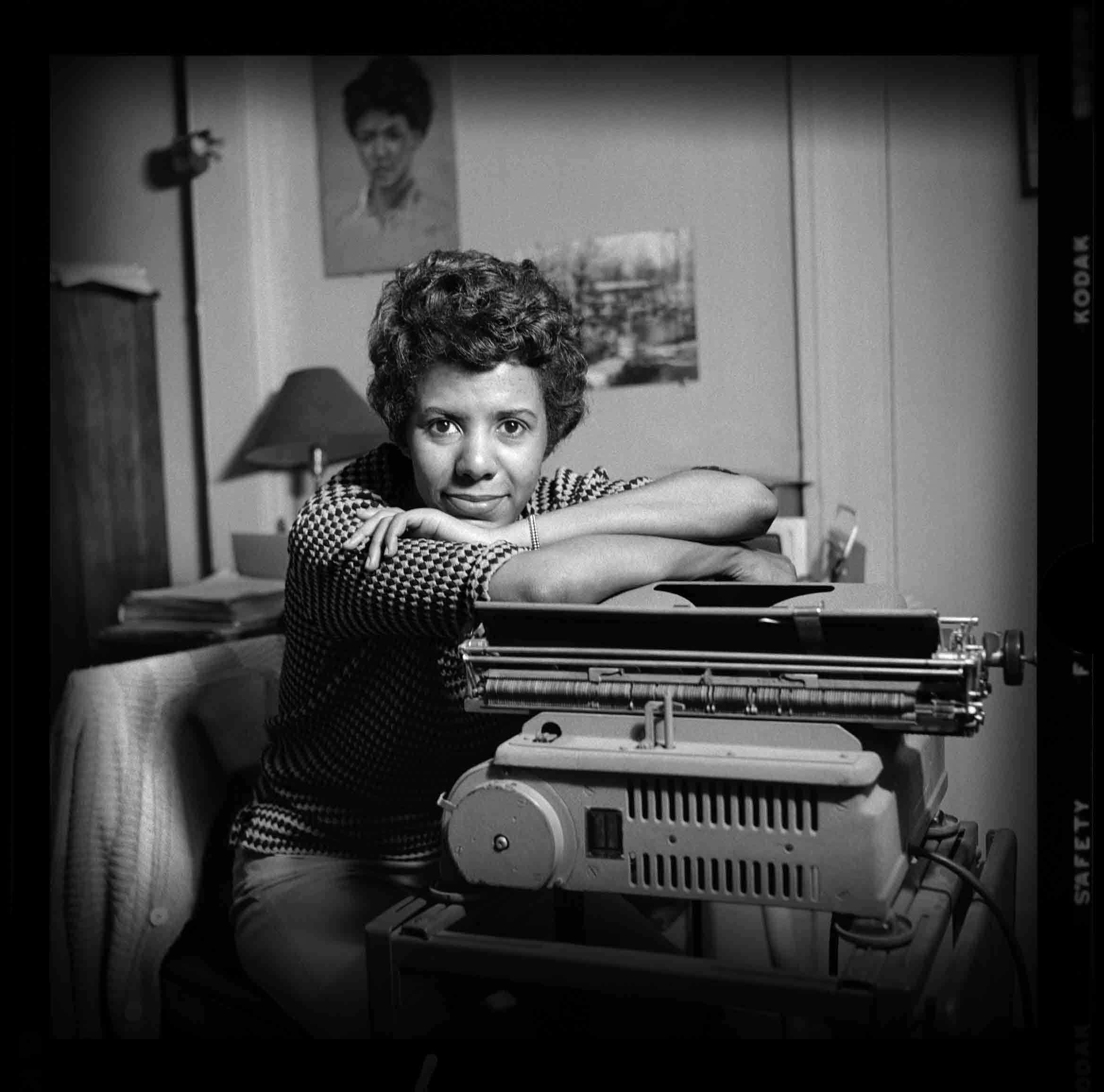
Born in 1930, Lorraine Hansberry was many things, but above all else she was fearless in her groundbreaking work, both in the theatre and as a leading intellectual figure in the burgeoning social movements of the 1950s and ‘60s. She was the first Black female playwright to have her work produced on Broadway, the now classic “Raisin In The Sun”, which portrays the challenges and struggles facing an African-American family in the late 1950s. But she was also a high-profile political activist, humanist and intellectual. W. E. B. DuBois served as one of her mentors, and before her success as a playwright she worked at Freedom, a Black newspaper co-founded by Paul Robeson and based in Harlem. As one profile of her noted, while working as a reporter she produced articles about “the feminist movement, domestic activism challenging Jim Crow laws, and anti-colonialist struggles from around the globe.” That was anything but safe territory for any person to be staking out in the U.S. in the early 1950s. Neither was support of Communism, or being queer.
Along with her close friend, the equally fearless writer James Baldwin, she believed that everyone had a responsibility to do their part to make this world a better place, and to not accept the status quo when it comes to civil rights for marginalized communities. Her life was cut far too short from cancer at age 34 in 1965, but her legacy through her plays and activism lives on.
Jay Kaplan, Nancy Katz & Margo Dichtelmiller LGBTQ+ Rights Project staff attorney
Loretta Ross, the Mother of Reproductive Justice

Loretta Ross is a Black woman activist who has fought for reproductive justice for more than four decades. Ms. Ross and a cohort of Black feminists birthed the reproductive justice movement, a movement that looks beyond abortion access to demand the right to have a child, the right not to have a child, and the right to raise children in a safe and healthy environment.
Ms. Ross and her sisters brought the concerns of forced sterilization, poverty, mass incarceration, access to safe housing, access to childcare, and other economic, racial, and political issues that affect the reproductive freedom of women of color, into the conversation. You can learn more about reproductive justice through one of the organizations Ms. Ross helped found, SisterSong Women of Color Reproductive Justice Collective.
Mary Bejian, director of philanthropy
Dolores Huerta, American Labor Leader and Civil Rights Activist

A friend of mine recently sent me a picture of a quote from our high school yearbook that said that my ambition was “to one day become the next Cesar Chavez.” If you were to ask me today why I chose him and not Dolores Huerta, the courageous woman who, along with Chavez, co-founded the United Farm Workers union in 1962, I’d say: Because, as a high school student in 2005, I was completely unaware of the pivotal role she played in labor and Chicano history. Which is one of the problems women in male-dominated societies continue to face: The spotlight tends to be placed primarily on men, not the women doing equally important and inspirational work. In fact, it wasn’t until I began pursuing a degree in Social Relations & Policy at Michigan State that I finally became aware of the person the National Women’s History Museum calls “one of the most influential labor activists of the 20th century.” My enlightenment came when, as part of my studies, I immersed myself in the “Cesar E. Chavez Collection” housed at the MSU library. That’s where I first learned of Dolores, and the groundbreaking work she helped spearhead. It is also where I learned how Dolores used the discrimination that she experienced throughout her life to fuel her work as a labor and Chicano rights activist.
She has spent her life fighting the same fights that many of us are still entrenched in, such as voting rights, gender equality, disability rights, and economic improvements for Chicanos and other impacted communities. Dolores, now 93, is a living testament to the change that can be created through persistence, kindness, and an unwillingness to settle for less because of your sex, or the color of your skin. Without her influence, I may never have found my way into activism and, eventually, to the ACLU, and organization whose mission aligns with her work in so many ways. “Si, se puede!”
Elyse Lopez, administrative assistant
Michelle Obama, Simply Extraordinary

When I think of Michelle Obama, and why I so admire her, a quote from her book, Becoming, comes to mind: “I’m an ordinary person who found herself on an extraordinary journey.” Always rooted in her humble beginning, she takes nothing for granted including her ascent to becoming First Lady. She inspires, encourages, and calls upon others, especially young people, to aim high and chart their own extraordinary journey.
Hers began on the South Side of Chicago, where her father, Fraser Robinson, a city water worker, and stay-at-home mom, Miriam, raised her in an upper flat of a bungalow they rented from her great aunt who lived below, and where she shared a room with her older brother Craig. She took an hour-long bus ride to and from Whitney M. Young Magnet High School, Chicago’s first high school for high achievers, which, along with her intense work ethic, helped pave her way to Princeton University and Harvard Law School. It was at Sidley Austin, LLP, a prestigious Chicago law firm where she worked, that she met her husband, who she supervised when a summer associate (and who initially annoyed her for showing up late on his first day).
Mindful of her ‘ordinary-ness’, she leveraged her ‘extraordinary-ness’ to recognize people who might otherwise be overlooked, thereby raising their profile. A personal favorite is how she did this with her fashion choices, spotlighting emerging designers, especially people of color, including Detroit Native and Cass Technical High School alumni Tracy Reese. No Dior or de la Renta for the First Lady at the presidential inaugural balls. She chose then unknown Taiwanese Canadian Jason Wu to design her gowns. A seemingly small, yet brilliant way to say, “I see you, and now everyone else will, too.”
Ann Mullen, Communications Director
The thousands of Michigan women who fought to protect abortion access
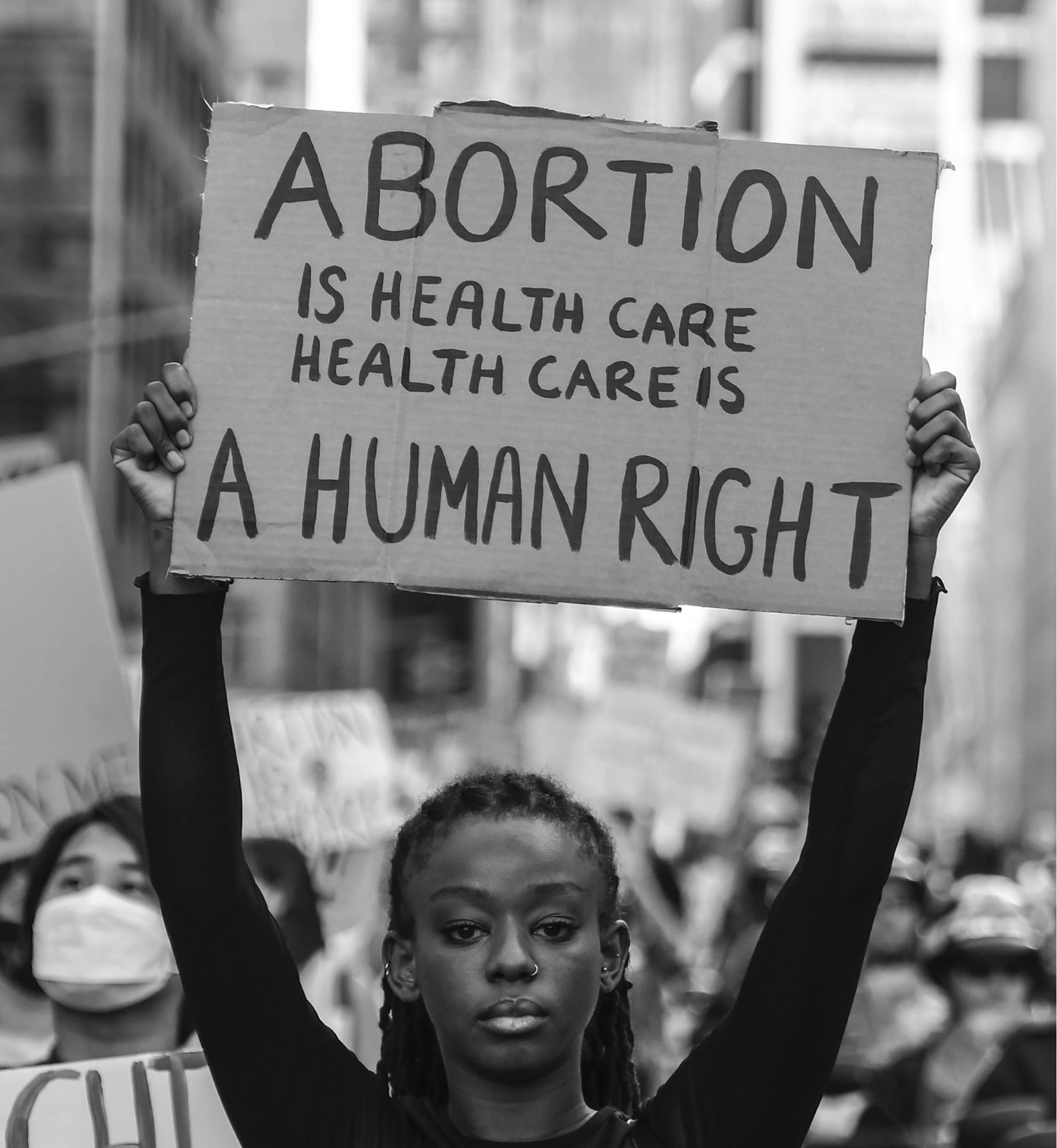
In 2022, women were faced with the unthinkable: Roe v. Wade was overturned by the U.S. Supreme Court, decimating the right to abortion. In Michigan, a sleeping giant was awakened – thousands upon thousands of women who said, “not here, not ever.” Over 10 months, Michigan women (and men!) collected more than 700,000 signatures to enshrine the right to reproductive freedom in our state constitution. Michigan women from every corner of the state committed to the Reproductive Freedom For All campaign, taking us to victory that November. The power of those months together, the anger, hope, and solidarity, was the most inspiring time of my life.
Mary Bejian, director of philanthropy
Aimee Stephens, LGBTQ+ Pioneer and Civil Rights Icon
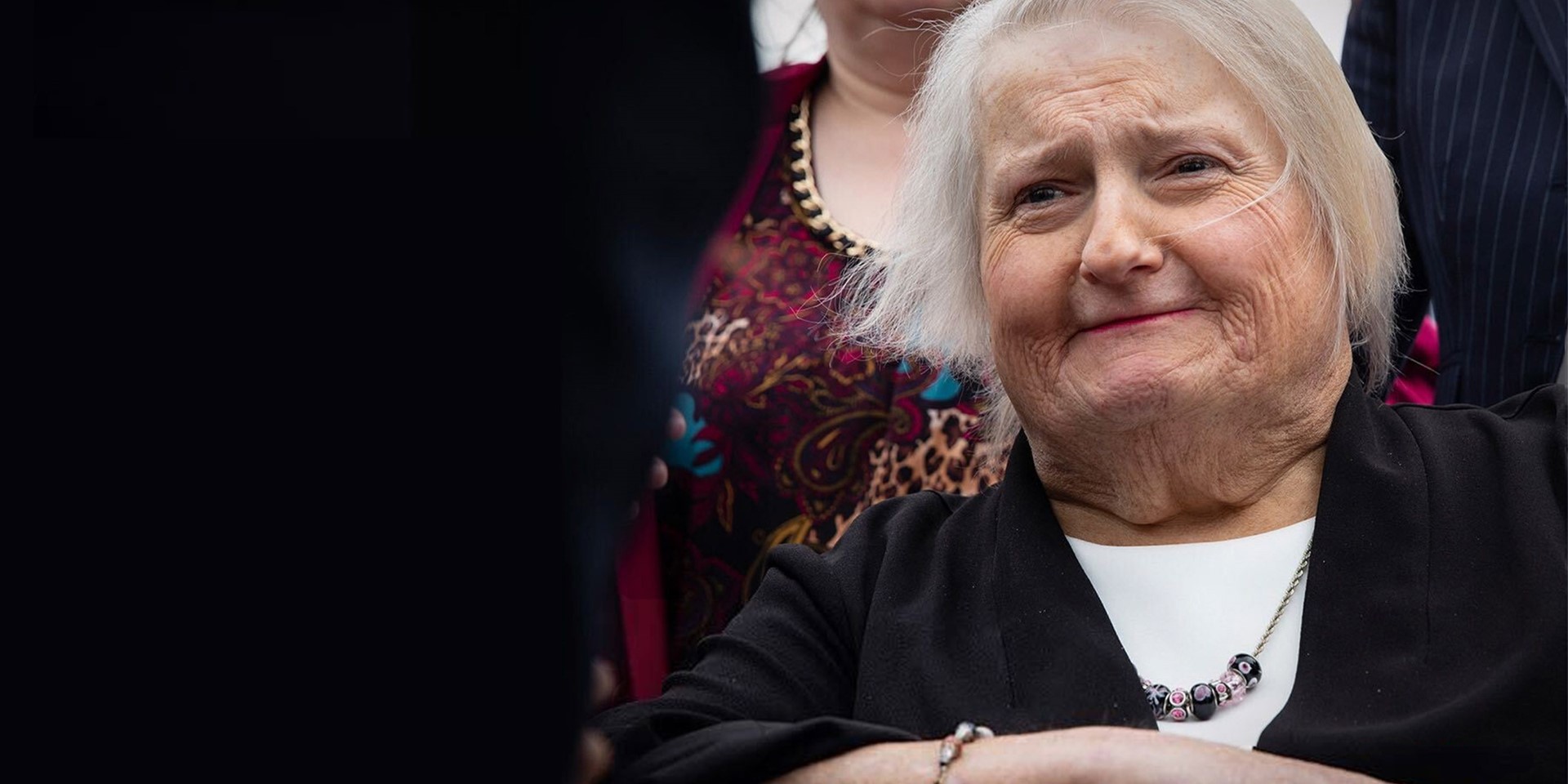
Thinking about Aimee Stephens, the quality that most comes to mind is her incredible courage. The courage to fight for the rights of trans people everywhere in America. The courage to keep on fighting, even as she was dying of kidney disease. But most of all, the courage to live as her authentic self in a world where people like her, far too frequently, are forced to face the dangers spawned by bigotry and hate.
In the end, what she found was the adulation of an adoring LGBTQ+ community and its allies, and a far-reaching legacy that continues to grow.
Even as a child, Aimee realized that the gender assigned to her at birth did not match the person she knew herself to be. For as far back as she could remember, she thought of herself as a girl, yet continued to live life as a man until she was in her 40s. Finally, she reached the point where something had to change. She could either start living as a woman, or no longer go on living at all. As she stood in her backyard, pistol in hand as she contemplated her fate, she finally determined that she liked herself too much to end it all.
Instead, she decided to begin living life as a woman, not just at home, where she’d already come out to her wife Donna – a truly remarkable woman in her own right – but also at the R.G. and G.R. Harris Funeral Homes where she had worked for six years. When the funeral home fired her rather than let her present as a woman, she began what turned out to be a grueling, seven-year legal battle that culminated with a landmark U.S. Supreme Court ruling that it is illegal to discriminate against people because they are transgender.
Following oral arguments, Aimee, suffering terribly from the debilitating effects of advanced kidney disease, was pushed in a wheelchair onto the steps of the Court, where she was met with ringing applause from an appreciative throng chanting: “We love you, Aimee! Ai-mee! Ai-mee!”
She died before the Court reached its precedent-setting decision. But her hope that the sacrifices that she made, and all that she endured would help others from experiencing the same sort of hurtful discrimination were realized.
And the inspiration her courage provided will continue to live on.
Curt Guyette, editor at large

